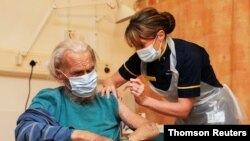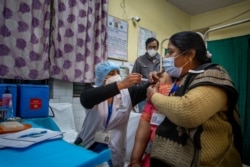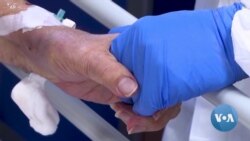Britain began administering the first doses of AstraZeneca's coronavirus vaccine Monday. An 82-year-old dialysis patient at Oxford’s Churchill Hospital was the first person to be inoculated with the vaccine.
The AstraZeneca vaccine is cheaper and more easily transported than the Pfizer-BioNTech vaccine because it doesn’t need to be kept at very cold temperatures. The Pfizer shot has already been administered to many health care professionals in Britain and the United States.
According to the country’s health minister, Britain will begin inoculating people at six hospitals around the country Monday. Sunday, India approved the same vaccine for emergency use.
The good news comes as Britain marks surges in coronavirus cases, particularly a new variant that scientists believe is more contagious.
Britain’s Prime Minister Boris Johnson warned Sunday of new lockdowns to be issued across the country.
“We are entirely reconciled to do what it takes to get the virus under control that may involve tougher measures in the weeks ahead,” Johnson told the BBC.
Greece’s health ministry confirmed four cases of the new variant of the virus Sunday in people who had recently traveled to Britain.
On Sunday, India approved for emergency use the same AstraZeneca vaccine that Britan is using.
India also approved an India-developed vaccine for emergency use, but some medical experts have raised concerns about the rushed approval of the domestically produced vaccine.
The All India Drug Action Network questioned India’s lack of transparency about the domestically produced vaccine and the lack of information about the drug’s efficacy.
India said Monday it has recorded more than 16,500 new COVID infections in the past 24 hours.
India is second only to the United States in the number of COVID cases. India has 10.3 million cases, while the U.S. has 20.6 million, according to the Johns Hopkins Coronavirus Resource Center, which is tracking the global outbreak.
Los Angeles Mayor Eric Garcetti said Sunday on CBS’s Face the Nation that in his city someone is infected with the coronavirus every six seconds. He warned that what is happening in Los Angeles “can and will be coming in many communities in America.”
The Atlanta-based Centers for Disease Control and Prevention on Saturday said the U.S. had administered more than 4.2 million doses of the COVID-19 vaccines nationwide and distributed more than 13 million.
In Russia, Health Minister Mikhail Murashko said that more than 800,000 people had received the domestically produced Sputnik V vaccine and that 1.5 million doses had been distributed throughout the country of 147 million.
The Kremlin is pinning its hopes on mass vaccinations, not nationwide restrictions, to stop the spread of the virus and save its struggling economy from the hit of another lockdown.
Officials in Brazil, home to the third-highest number of cases globally at 7.7 million, recently told the Associated Press the country was at least three weeks away from launching any formal immunization campaign.
Colombia will lock down three neighborhoods in Bogota, the capital, beginning Tuesday in an effort to stop a surge in COVID cases.
South African leaders announced Sunday that they hope to begin vaccinating their populations in February.
In Zimbabwe, where recorded cases have almost doubled since the beginning of November, government officials ordered a new containment Saturday evening. The country has recorded nearly 14,500 cases to date, including 377 deaths, according to Johns Hopkins.
In South Africa, government-backed security forces stepped up a "zero-tolerance approach" to enforcing a mask mandate, and President Cyril Ramaphosa banned alcohol sales, calling it a root cause of accidents and violence that strain hospital resources.
The coronavirus has killed more than 1.8 million people globally since emerging in China in December 2019, according to Johns Hopkins.
Experts fear the worst is yet to come, predicting a sharp rise in cases and deaths after weeks of holiday gatherings.








